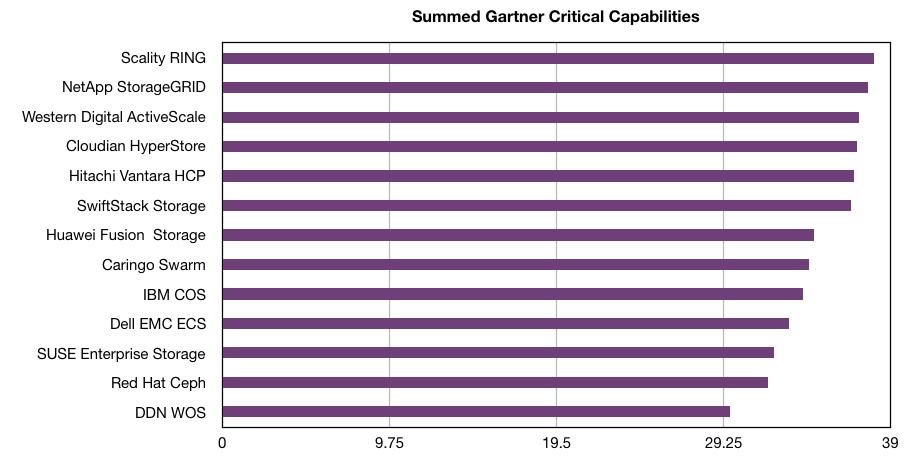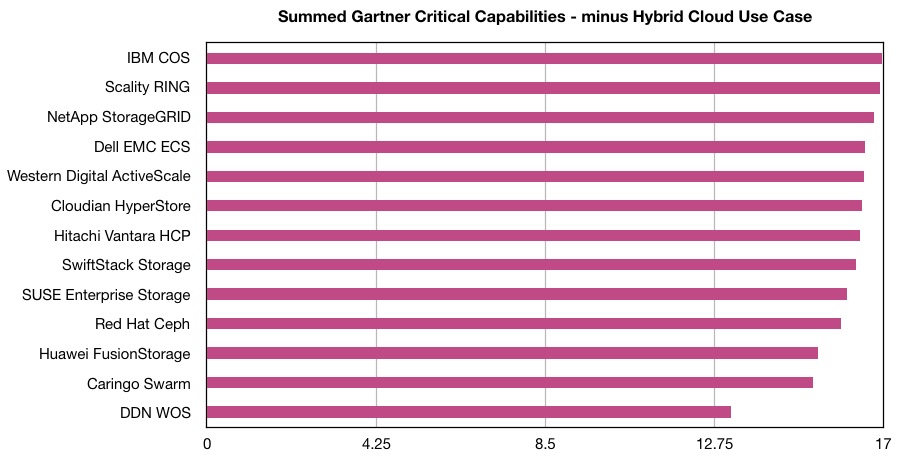Lack of Hybrid Cloud object storage capability sends Dell EMC, IBM, Red Hat and SUSE down to the bottom ranks in Gartner’s Critical Capabilities for Object Storage report.
The report evaluates object storage suppliers’ capabilities in five use cases; analytics, archiving, backup, cloud storage and hybrid cloud storage. It is based on an evaluation of a suppliers’ strengths in capacity, storage efficiency, interoperability and five other attributes. Each of these attributes is given a weighting for each use case and the vendor scores calculated using the attribute scores modified by the use case weightings.
Generally the supplier rankings are fairly stable and consistent, except in the hybrid cloud use case, which bridges on-premises and public clouds. Here Dell EMC ECS, IBM COS, Red Hat Ceph and SUSE Enterprise Storage are all given a ‘not applicable’ status, while Scality RING gets the top score. It is second in all the others.
The report can be downloadedfrom Scality’s website (registration required.)
We summed all the scores in all the use cases by vendor to get an overall sense of how they compared, and charted them:

You can see how Dell EMC, IBM, Red Hat, and SUSE are all penalised by their inferior hybrid cloud ranking. DDN is bottom but that is because it is relatively poor in all use cases, including hybrid cloud,
If we rank the vendors with the hybrid cloud scores removed then the chart is different and shows IBM is the top-ranked vendor, with Dell EMC in fourth place.

Huawei, Caringo and DDN’s object storage products get a low ranking.
The Gartner report writers’ key findings are:
- Enterprise endeavors to port to object APIs for on-premises applications continue to happen slowly; as a result, most customers continue to require file protocols.
- Most object storage products should come with cautionary warnings to enterprises considering lackluster Network File System and Server Message Block designs in object storage products.
- Late-adopter enterprises are beginning to evaluate on-premises object storage products to manage unstructured data growth; however, they don’t always understand the optimal use cases and challenges that arise when using object storage for general-purpose, unstructured data.
- The best use case for object storage is one in which an API-driven application requires a large repository for unstructured data that would be inefficient if stored using traditional file systems.
- The worst use case for object storage is one in which an end user consumes object storage through a file gateway for personal and home directories, due to inherent incompatibilities between the file gateway and the object storage platform.
Their recommendations are:
- Evaluate distributed file systems, rather than object storage products, if the primary use is file-based. If cost is the primary driver, verify that there aren’t similar savings from existing file-based storage; cost savings from object storage typically show up in large-scale deployments.
- Deploy object storage products for applications that require large repositories for unstructured data in which they control the API integration.
- Insist on speaking to object storage vendors’ reference customers, particularly for multisite deployments, because reliability is a significant challenge for vendors with less-mature support for such deployments.
- Evaluate products from vendors that offer integrated backup appliances, rather than selecting their own object storage solution behind third-party backup software.
This Gartner Critical Capabilities report is worth reading by anyone thinking about deploying object storage.








